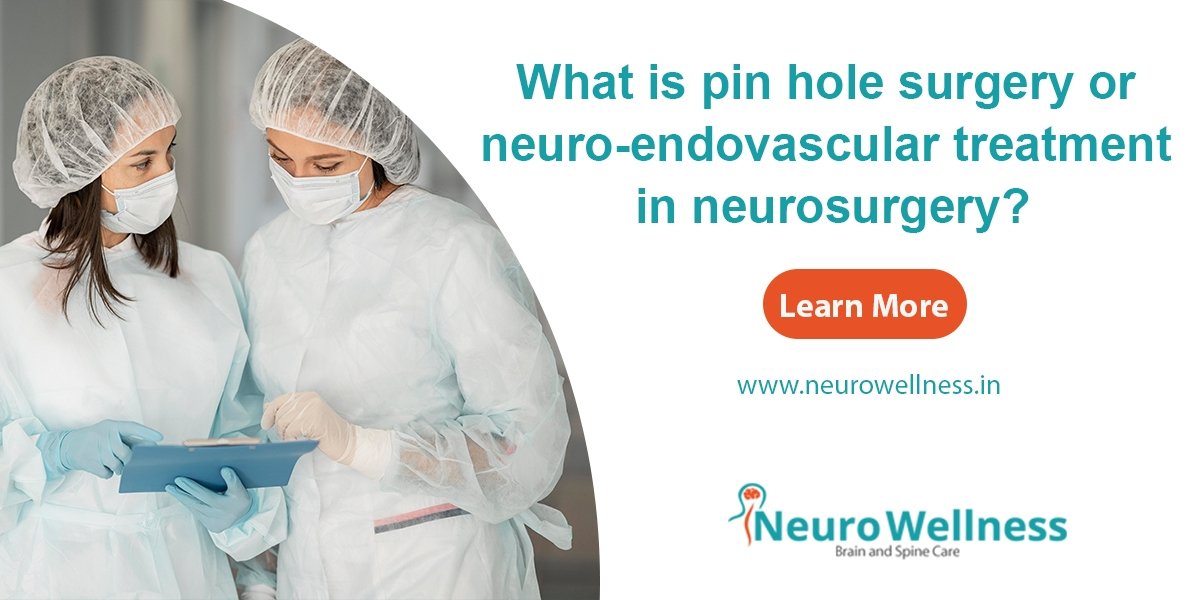Brain and spine surgeries no longer need large incisions or long hospital stays.
At Neurowellness Bangalore, our neurosurgeons now perform pin-hole or neuro-endovascular procedures—minimally invasive treatments that repair blood vessels and aneurysms through a small artery puncture.
“Endovascular or pin-hole neurosurgery represents the biggest leap in patient safety since the microscope,”
— Dr. Ganesh Veerabhadraiah, Senior Neurosurgeon, Neurowellness Bangalore
What Is Pin-Hole / Neuro-Endovascular Surgery?
A catheter-based technique that treats brain or spine disorders through a 2–3 mm groin or wrist opening—no skull opening required.
| Condition Treated | Traditional Surgery | Pin-Hole / Endovascular |
|---|---|---|
| Brain Aneurysm | Craniotomy + clipping | Coiling / Flow Diversion |
| AVM (Arteriovenous Malformation) | Open Resection | Embolization |
| Stroke (Clot Removal) | Thrombolysis | Mechanical Thrombectomy |
| Spine Vascular Lesions | Laminectomy | Spinal Angioplasty |

Dr. Ganesh Veerabhadraiah
Consultant – Neurosurgeon, Neurointerventional Surgery, Spine Surgeon (Neuro)
23+ Years Experience Overall (17+ years as Neuro Specialist)
Available for Consultation: Jayanagar 9th Block & Kauvery Hospital, Electronic City
How the Procedure Works
1️⃣ Micro-catheter Insertion – A soft tube guided via X-ray imaging.
2️⃣ Navigation to Brain Vessels – Real-time 3D maps ensure precision.
3️⃣ Device Deployment – Coils, stents, or glue seal the abnormal vessel.
4️⃣ Monitoring & Recovery – Patients usually walk within 24–48 hours.
Benefits of Pin-Hole Neurosurgery
ㆍMinimal incision, no visible scar
ㆍ60 % shorter hospital stay
ㆍReduced infection risk
ㆍFaster return to work
ㆍLower blood loss and post-op pain
Conditions Treated with Endovascular Approach
ㆍBrain aneurysms & arterial ruptures
ㆍStroke (clot removal / thrombectomy)
ㆍAVMs and cavernous malformations
ㆍSpinal vascular lesions
ㆍCarotid artery stenosis
Recovery & After care
✅ Most patients discharged within 2 days
✅ Resume normal activity in 1 week
✅ Follow-up angiogram after 6 months
✅ Avoid heavy lifting for 10 days
✅ Continue prescribed blood thinners if indicated
When to Consider Pin-Hole Neurosurgery
ㆍDiagnosed brain aneurysm or blocked artery
ㆍRecurrent stroke symptoms despite medication
ㆍHigh surgical risk (age > 60 / comorbidities)
ㆍDesire for faster recovery with less pain
Conculsion
Advanced Endovascular Treatment at Neurowellness Bangalore
World-class equipment + AI navigation + expert neurosurgeons = faster, safer recovery.
FAQs
1. Is pin-hole neurosurgery safe?
Yes. It reduces blood loss and infection risk and is performed by specialists in advanced neuro centres.
2. Who is eligible for endovascular treatment?
Patients with aneurysms, AVMs, or blocked arteries detected on MRI / angiogram.
3. What is the recovery time?
Most patients return home within 48 hours and resume daily activities in a week.
4. How does AI help in these procedures?
AI software assists navigation and real-time decision-making to minimize error and improve outcomes.

About Author
Dr. Ganesh Veerabhadraiah
Dr. Ganesh Veerabhadraiah, leading neurosurgeon and neurologist in Bangalore, has over 20 years of expertise in managing back pain, migraines, headaches, neuro disorders, and spine problems. His clinical excellence and patient-first approach make him one of the most trusted neuro doctors in Bangalore.
At Neurowellness Brain & Spine Clinic in Jayanagar and Kavery Hospital Electronic City, Dr. Ganesh provides comprehensive treatments ranging from minimally invasive spine surgery to advanced neurological care. As a respected back pain specialist and migraine doctor, he continues to deliver reliable outcomes for patients.
👉 Connect with Dr. Ganesh on LinkedIn


Comments are closed.